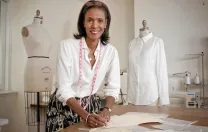Fashion has become the subject of Harvard scholarship. Professor of law Jeannie Suk, for example, has analyzed intellectual-property issues involved in fashion design (see “Real Fashion Police,” July-August 2010, page 9) and in 2011 testified before the U.S. House of Representatives, which was considering adding protection for fashion designs to the copyright law. (The House ultimately did not act to change the law, although a Senate committee approved a new version of the bill in 2012.) This issue has become increasingly important as the market for fashion has grown from an exclusive elite to a broad, international body of consumers.
“In America there has been a process of fashion becoming more widely disseminated,” Suk says. “In the early twentieth century, the garment and fashion industries were focused in the local metropolitan culture of New York City—really, a certain stretch of Manhattan. With the growing ease of travel and communication and the wider dissemination of newspapers and magazines, fashion trends spread much more broadly and rapidly. Now the Internet has exponentially sped up and broadened the diffusion of fashion trends.
“In a way, fashion is the exemplar of dissemination,” she continues, “because it is so much about trends. Fashion is not just a trivial interest, but a real indicator of where a culture is going. Like theater, film, art, or music, it has become one of the cultural vectors that give us a sense of what is going on in our society.”
Fashion is also attracting attention from business-school faculties and students. “In business schools in general, the study of fashion is new,” says associate professor of business administration Mukti Khaire, who teaches a course on entrepreneurship in creative industries. “Most of the past scholarly work has been in sociology—gender, the body politic, how changing styles reflect social norms. For business research, there were real hurdles. The main one is that, until recently, most fashion firms were privately owned, so they never had to disclose data on financial performance. When I was in New York doing research for my Ph.D., I went to the Garment District and knocked on doors. Almost every firm was an individual DBA [Doing Business As]. No databases exist, making quantitative analyses difficult. Another obstacle was the attitude of the people in the industry: designers don’t like to think of themselves as a business—they’re in it for the creative satisfaction.
“In some ways, fashion firms are like restaurants, which are known as the fruit flies of the business world,” she continues. “It’s easy enough to start a fashion company. But it is very hard to scale it, and even harder to grow beyond the founder. We know the ones that survived beyond the founder—they have names like Chanel, Prada, Balenciaga, Dior. All start-ups are dependent on their founders, and you can learn a lot from fashion companies about how to manage succession after the founder leaves or dies. Chanel went through a period of not doing very well after Coco Chanel died [in 1971]. There is something ineffable, intangible, about understanding the design code and language of a brand, and interpreting what Chanel stands for in the present moment. There’s a weird tension between the old and new.”









